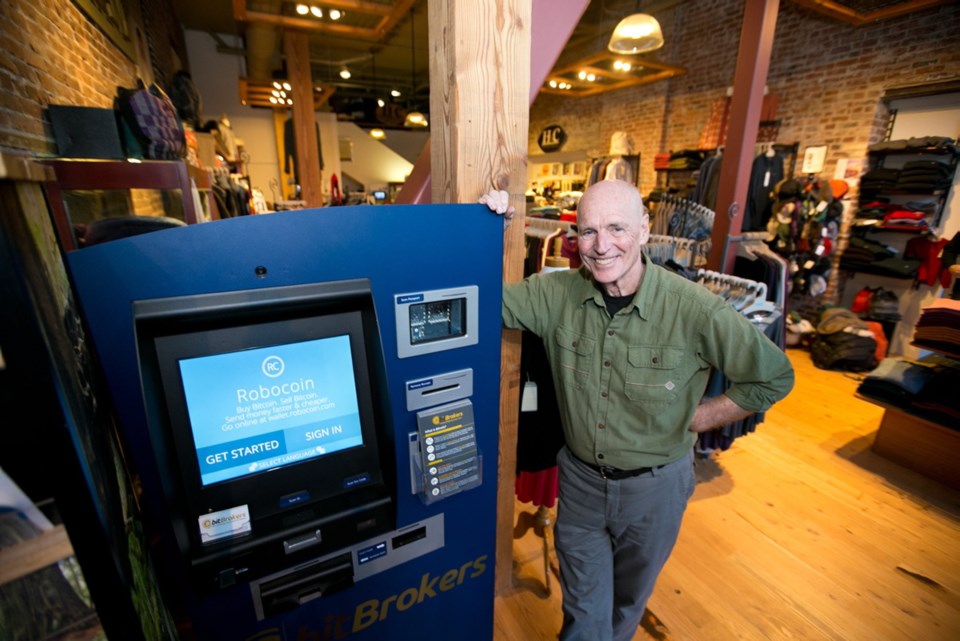It’s still well outside the mainstream, but if use of the city’s first bitcoin automated teller machine is any indication, the virtual currency is making small strides to broader acceptance.
Six months after the first bitcoin ATM was installed at Hemp & Company downtown, the machine has been put through its paces. “We have had a tonne of people come by and try the machine, some just looking and regular users who we see all the time,” said Scott Sheldrake of Bitbrokers, a Victoria company that owns the machine.
Sheldrake said the machine, which both buys and sells bitcoin, has processed 641 transactions so far. “We were basing [our business plan] on Vancouver, but it’s a bigger city. We have been surprised by the people using it,” Sheldrake said. He added there has been a surprising number of female users, given the typical bitcoin believer tends to be male.
The machine was the first of its kind installed in Victoria. Two other machines had been installed in different locations by other companies, but have since been removed. One company cited a lack of use for the decision. The other faced a series of problems originating with the manufacturer.
There are five machines operating in B.C. According to Bitcoinmap.com, 24 are in use across Canada.
The Victoria machine is hooked up to the Cointrader online exchange in Vancouver and when customers sign in they can either buy or sell. For those buying — the ATM allows up to $3,000 worth per day — money is inserted and the machine will direct bitcoin to whatever virtual wallet is designated, be it on a smartphone or a bitcoin account online.
For those selling from a virtual wallet, such as retailers who accept bitcoin, the bitcoin is sent to the address of the ATM and a claim ticket is printed. After confirmation, which can take about 20 minutes, the claim ticket can be redeemed for cash dispensed from the ATM.
Sheldrake said it’s hard to know what people are using their bitcoin for, but in talking with some users he said much of it is being used to transfer money instantly over long distances.
Bill Finley, owner of Hemp & Company and an early adopter of bitcoin as a currency, said having the machine has been a small boon to the business.
“It’s raised awareness of bitcoin and it has brought people into the store who may otherwise not have come in. We hope they are looking around, saying: ‘Hey, nice store,’ ” he said.
As for bitcoin use for purchases, Finley said it’s slow. “We may do one bitcoin transaction a month,” he said. “But it’s been a simple procedure to take it as payment, and it does open us up to a market we may or may not have bumped into. Certain people may come and see us because we take bitcoin.”
Dylan Parker, organizer of the Victoria Bitcoin Meet-up Group, said there are still just a handful of retailers in the city accepting bitcoin, but he suggested acceptance among consumers is growing.
“For retailers, it’s been a slow process,” said Parker. “But eight months ago, I’d ask them if they were considering taking bitcoin and they’d have a blank stare. Now they are saying they’ll wait to see if there’s more adoption.”
Parker founded the group on Oct. 15, 2013, and it has grown to more than 150 members. “As the bitcoin price goes up we see more members, and as it goes down we see it settle.”
As of late Wednesday one bitcoin was valued at $426.85 Cdn, according to Coindesk.com.
Bitcoin has taken a few shots because of its volatility as a currency and its use by the underground market in the sale of illegal drugs and money laundering.
The Bank of Canada has warned users they were not protected when using unregulated, electronic currency such as bitcoin, prepaid credit cards and services like PayPal. Still, deputy governor Carolyn Wilkins noted the bank is evaluating the benefits of digital currencies and weighing the benefits of issuing electronic money.
Wilkins said the increasingly popular digital currencies are not big enough to pose material risk to Canada’s financial stability.



